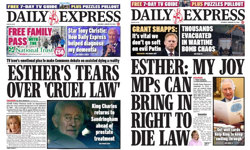The article claimed that Rupert Murdoch was "once warned by Gordon Brown, while still in No 10, that he would smash the tycoon's media empire if Labour won last year's general election" and that he had "told Rupert he had made his choice politically and [...] ‘you had better win the election or we are coming for you' - or words to that effect".
Mr Brown denied the claims vigorously: the telephone call was about The Sun's reporting of Afghanistan and was a personal conversation between the parties. The newspaper had published it as fact, and had not put the allegation to him before running the story. After publication, Mr Brown had contacted the newspaper directly to complain (which had led to the article being amended to include his denial in the online and print editions, before it was removed entirely from the newspaper's website). Mr Brown wished for a correction and an unreserved apology, providing five witness statements to corroborate his position and a contemporaneous email to Mr Murdoch.
The newspaper said that the anecdote had been confirmed by two sources from Mr Brown's inner circle, both of whom wished to remain anonymous. While it stood by the reliability of its sources, the newspaper said that it had acted immediately to address the concerns raised by Mr Brown. In addition to amending the piece online and in later editions (and its subsequent removal), it had published his denial the following week in addition to offering to publish a follow-up interview or letter. Following the complaint to the PCC, it then offered to publish a stand-alone text outlining the complainant's position. These offers were rejected by Mr Brown.
The Commission acknowledged that confidential sources are a fundamental feature of journalism, especially in political stories. However, it made clear that newspapers cannot simply rely on such sources when material provided by them is said to be inaccurate. As set out in previous case law, publications "must be able to provide corroborative material to substantiate the allegations or to demonstrate that the complainant has a suitable opportunity to reply". In this particular case, the Commission ruled that the story had originally been presented as a factual statement, and that readers would not have been aware that the accuracy may have been in dispute. Whilst the Commission wished to make clear that prior notification is not an absolute requirement under the Editors' Code, the omission of the complainant's position in regard to this point had led to an initial breach of the Code in this instance. However, the Commission was satisfied that the actions offered by the newspaper, including the offer to publish a stand-alone text, represented a sufficient remedy to the initial breach, noting that stand-alone text "represented the most appropriate manner in which the position could be made clear to readers".
Stephen Abell (pictured), Director of the PCC, said: "This adjudication is a timely reminder to editors of the principles that the Commission has previously set out when ruling on stories which rely on anonymous sources. The Commission's case law makes clear that publications are required either to produce corroborative, on-the-record material to substantiate the allegations, or to demonstrate that the person involved was given a suitable opportunity to comment on them. The Commission was satisfied that the action both offered and taken by the newspaper remedied the breach of the Code, and is pleased that the text was published in yesterday's edition of the newspaper".
To read the adjudication, please click here.
The text referred to in the adjudication was published in the Sunday Telegraph (p2) and online.
The Editor of The Sunday Telegraph, Ian MacGregor, is an editorial member of the Commission. He took no part in consideration of this complaint, and left the room when it was discussed. This is in line with the Commission's usual procedures when a title edited by an editorial member is subject to a complaint. The Commission has a Register of Interests which is available here.










